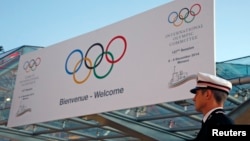Radical changes to how cities will bid to host Olympic Games, and rules allowing more sports to feature, were ushered in on Monday as International Olympic Committee members took bold steps to revamp their movement.
Sweeping changes to the bidding process were unanimously approved, making it easier and cheaper for host city hopefuls.
IOC members also scrapped a cap on 28 sports for a Summer Olympics, agreeing instead to limit the Games to 10,500 athletes and 310 events.
The move means sports such as baseball, softball, squash or karate can now be added if room is made by another sport that enjoys multiple events.
The votes kick-started a Monaco meeting of more than 100 IOC members that promises to drive change and innovation among the kingpins of global sport.
Venues
The changes to the bidding process include allowing hosts to stage some Olympic events in other cities, and even other countries.
“The compactness of the Games has to be weighed up against the benefit of using existing venues,” Australian John Coates told his fellow members at Monaco's Grimaldi Forum.
“These changes do contemplate different cities and countries hosting the Games, and this is for reasons of sustainability,” added Coates, who led a working group looking at the bid process.
Eager to avoid a repeat of the 2022 Winter Games campaign in which four of six candidates dropped out in mid-race over financial concerns, denting the Games' reputation as a lucrative project, the IOC voted unanimously to adopt the recommendations.
Goal: Reducing costs
The changes are aimed at reducing the cost of bidding and allow candidates to integrate the Olympics into their city plans rather than the other way round.
Changes also include an invitation phase where potential candidates can first discuss plans with the IOC before deciding whether to launch a campaign to stage the Games.
This will avoid a situation like the 2022 bidding debacle.
Cities have spent close to $100 million on campaigns aimed at wooing IOC members to give them the honor of staging the Summer Olympics.
Regarding the makeup of the sports program, any evaluation would be done in collaboration with the sports' international federations, the IOC said.
It will decide on the events for an Olympics not later than three years prior to the opening of the Games.
Members can now brace themselves for a period of intense lobbying ahead of the 2020 Tokyo Games, with baseball and softball in particular seeking a spot on the program.
Golf and Rugby Sevens join the program for the 2016 Games in Rio de Janeiro.
“We have all gathered here to lead this change in sport,” IOC president Thomas Bach told members as he opened the 127th Session on Sunday night.
“If we do not address these challenges here and now we will be hit by them very soon.
“If we do not drive these changes ourselves, others will drive us to them. We want to be the leaders of change in sport, not the object.”





